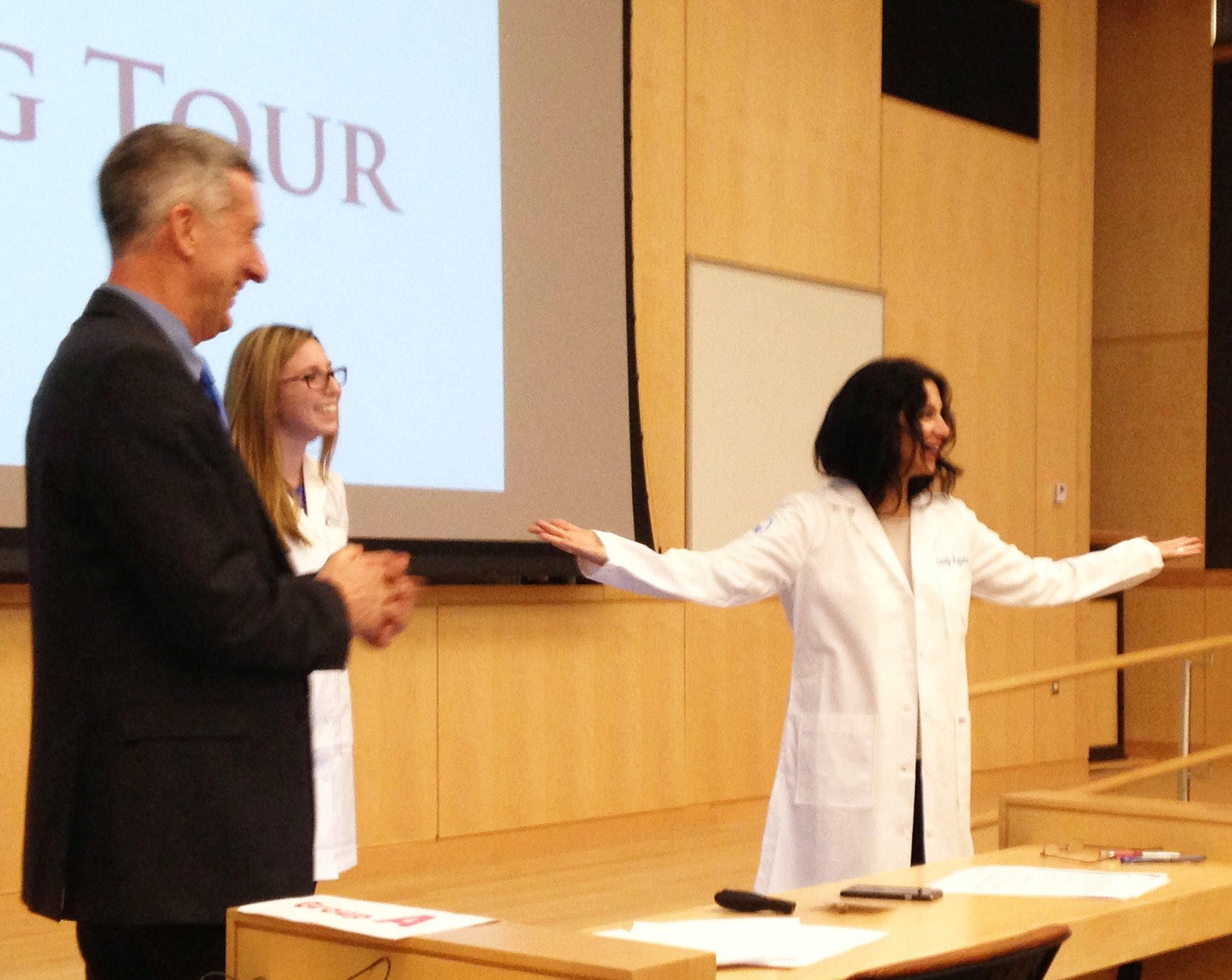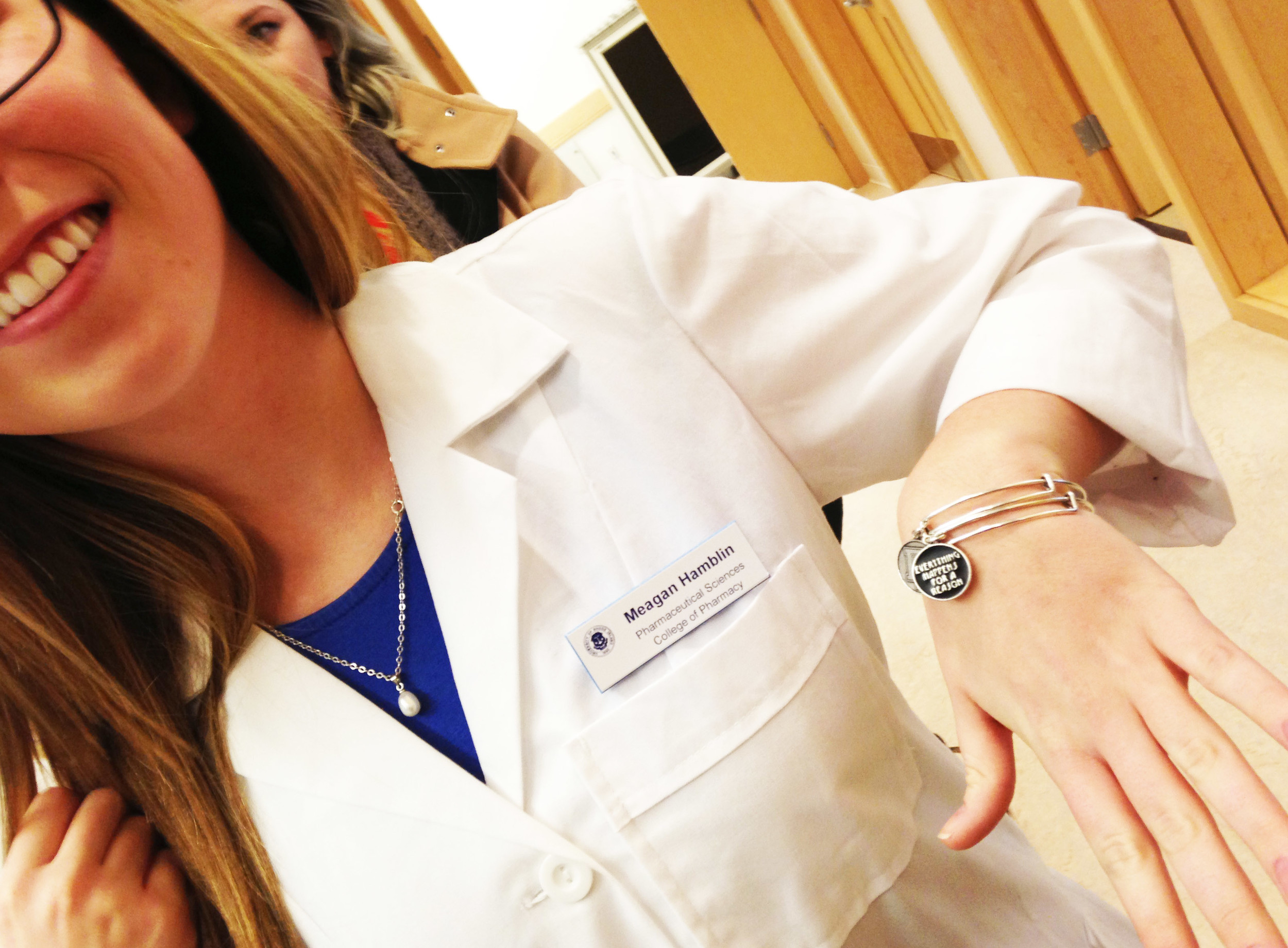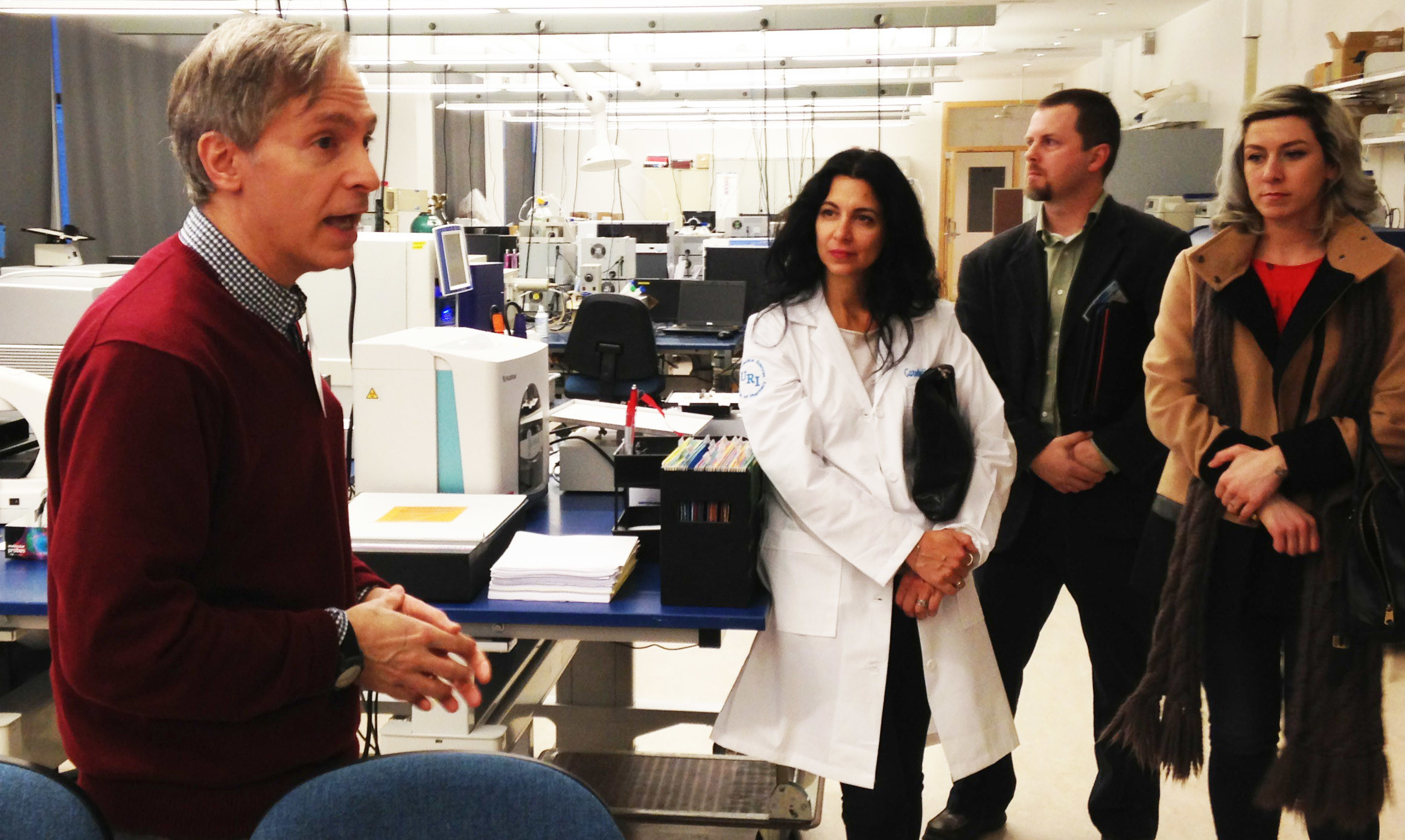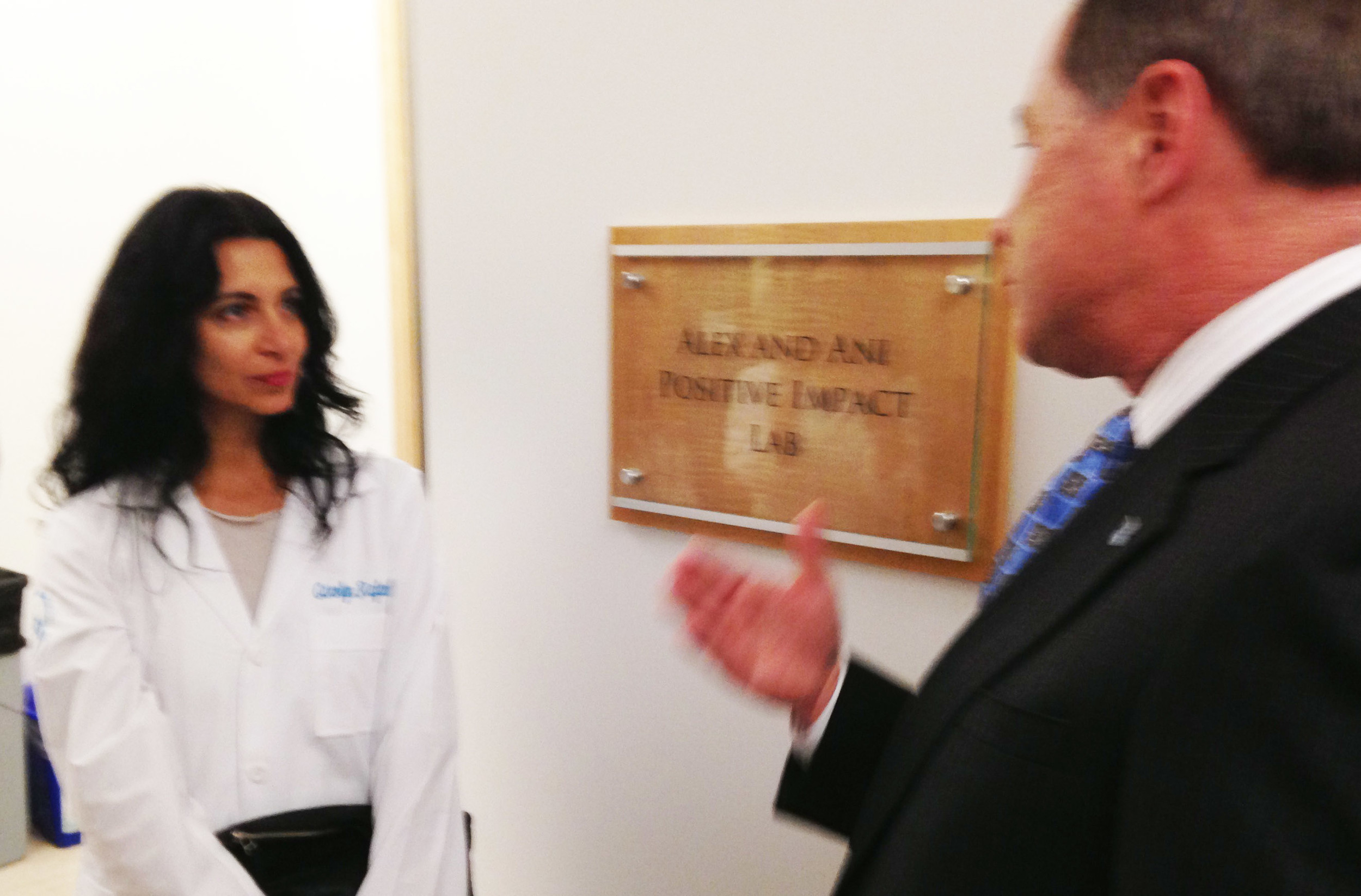Make way for the positive day in research
URI’s College of Pharmacy unveils the newly named Alex and Ani Positive Impact Lab
The IlluminOss system uses a light-curable polymer, contained within an expandable balloon catheter, to achieve bone stabilization. In many cases it allows the patient to get back to daily activities more quickly without the hindrance of a hard cast.
KINGSTON – It was positioned as a big corporate moment for science and research at the University of Rhode Island: the unveiling of the newly named Alex and Ani Positive Impact Lab at the College of Pharmacy.
The star of the show was Carolyn A. Rafaelian, the founder and CEO of Alex and Ani, Inc. and a URI graduate from the class of 1989, who was delighted to be given her own white lab coat with her name stitched in blue letters.
The event on March 4, hosted by the College of Pharmacy and the Business Engagement Center, was also co-sponsored by MedMates, the R.I. Science and Technology Advisory Council and the R.I. BioScience Leaders.
The afternoon was designed to preview the pharmacy school’s Corporate Affiliates program.
With Interim Dean E. Paul Larrat serving as emcee, the program featured brief, 5-minute talks focused on the ongoing research efforts.
Nasser Zawia, dean of the Graduate School and director of the George & Anne Ryan Institute for Neuroscience, talked about his research exploring environmental risk factors, including lead exposure, in the development of Alzheimer’s disease. Zawia also spoke about the his research to develop a new class of mechanism-based drugs for the treatment of Alzheimer’s disease, including the successful use of tolfenamic acid in animals, to attack both plaque and tangle formations associated with the disease.
David Rowley, a professor at the College of Pharmacy and coordinator of the core research facility known as RI-INBRE program [a NIH-funded network of biomedical research excellence], detailed his work in marine natural products chemistry and antibiotics drug discovery. It was his lab space, he said, that was being renamed, and Rowley said that he was honored. Among his research projects, Rowley said that he was currently working with Oceanspray to look at the medicinal properties of cranberries.
Fatemeh Akhlaghi, also a professor at the College of Pharmacy, spoke about her research into the pharmokinetics and pharmcodynamics of drug interactions. Her work includes research into the way that drugs interact with natural product supplements.
Stephen Kogut, an associate professor of Pharmacy Practice, talked about his research in managed care pharmacy, working to develop more effective, lower-priced drugs.
At the close of the brief research talks, Meagan Hamblin, a student at the College of Pharmacy, presented Rafaelian with her own lab coat, which Rafaelian immediately donned, spreading her arms out to display the new garment.
Afterward, Hamblin showed ConvergenceRI her own Alex and Ani bracelets and charms, including one that said: “Everything happens for a reason.”
On tour
Officials from URI then led Rafaelian and a number of attendees, including ConvergenceRI, on a tour of the School of Pharmacy’s research facilities, which included the Center for Molecular Toxicology, the cGMP, or current Good Manufacturing Processes facilities in the basement of the building, and the Patients Simulation Lab on the first floor.
[A quick scientific family tree and road map: The Rhode Island IDeA Network of Biomedical Research Excellence, or RI-INBRE, is funded through NIH. RI-INBRE, in turn, supports what is known as a Centralized Research Core Facility.
Participating institutions include URI, Brown University, Rhode Island College, Providence College, Salve Regina University, Bryant University and Roger Williams University.
The Centralized Research Core Facility is housed at URI under the auspices of the Center of Molecular Toxicology in the College of Pharmacy. Its goal is to enhance biomedical research at universities and colleges in Rhode Island.]
Rafaelian was attentive and curious throughout the tour, engaging with the presenters, asking questions.
In the Patients Simulation Lab, where life-like plastic models could be monitored for their vital signs, and even respond with verbal comments [through a microphone with other students and instructors playing the patient], Rafaelian wanted to know if the model patients had been given names.
“The baby is known as Chuckie,” the tour guide explained, a name bestowed upon the model by students, after the fictional horror character; everyone laughed.
In the laboratory
Al Bach, a research assistant professor and manager of the Molecular Characterization Facility that is part of the RI-INBRE centralized research core facility, offered a brief overview of the instrumentation resources, which are available to researchers from both academia and private companies within the state.
It is equipped with instrumentation for biomedical, pharmaceutical and biotechnological research, including proteomics and genomics, chromatography, elemental analysis, cell culture and cell fractionation, spectroscopy and imaging.
As Rafaelian took a closer look at the instrumentation, ConvergenceRI asked Hamblin about her own opportunities for research. Hamblin said that she was working with a professor who was looking at the correlation between aluminum particles in deodorants and its potential link to breast cancer.
The tour then moved into the corridor for the unveiling of the Alex and Ani Positive Impact Lab, which was across the hallway from the Molecular Characterization facility.
Unveiling the plaque
URI President David Dooley was on hand to unveil the plaque in a short ceremony before a reception. Photos were taken, and the event was recorded using an iPad.
Among the guests at the tour and reception was James Dean Vogel, founder and managing director of The BioProcess Institute in North Kingstown, founded in 2007.
Vogel, a New Jersey native, told ConvergenceRI he had come to Rhode Island to be the lead designer of a $700 million biomanufacturing facility at Amgen.
Vogel had also worked with GlaxoSmithKline, ImClone, Sanofi-Pasteur, Lipton and Avon, according to his biography.
Vogel talked with ConvergenceRI about the differences between his experiences in New Jersey and its state economic development team, where decisions were made with what he called strong quarterbacking, and here in Rhode Island.
Vogel said he had been interested to talk with Stefan Pryor, the new head of the R.I. Department of Commerce, who had been invited to the event. But Pryor, Vogel said, had been delayed by traffic, according to one of the event organizers.
Outreach by Pryor
Pryor has begun to sit down and talk leaders of the biomedical industry in Rhode Island, offering assurances that the sector was high on his list of priorities and that he saw it as a potential driver for the state’s economy.
The co-chairs of the R.I. BioScience Leaders, a group of CEOs involved in the biomedical industry in Rhode Island, met recently with Pryor on March 3. Pryor is scheduled to address the group at a meeting scheduled for April 1.
Among other topics, the group will be seeking new state support for its InnovateRI initiative to assist Rhode Island companies who have been awarded SBIR grants.









